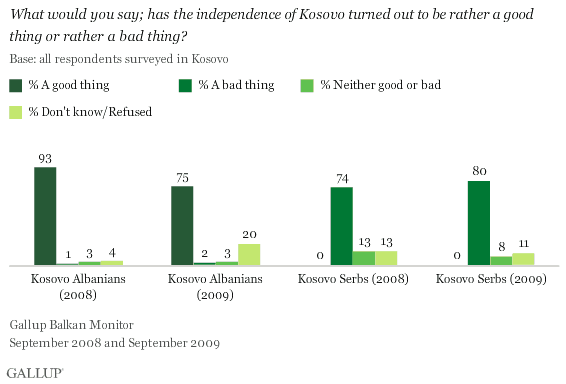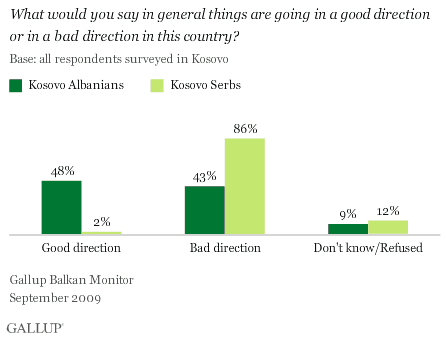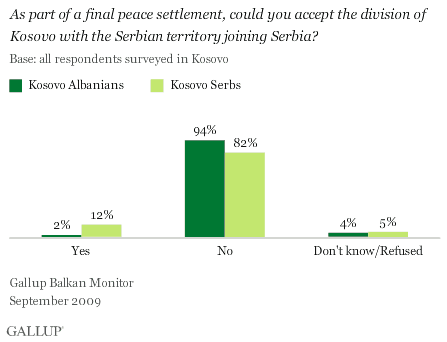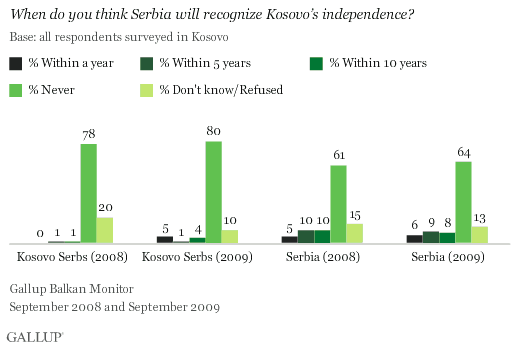BRUSSELS -- On the second anniversary of Kosovo's declaration of independence from Serbia, a look at the latest Gallup Balkan Monitor survey conducted in September 2009 showed Kosovo Albanians are less positive toward independence. Seventy-five percent of Kosovo Albanians said independence was a good thing, down from 93% who said so in 2008. One in five Kosovo Albanians said they did not have an opinion. Furthermore, in 2009, 80% of Kosovo Serbs believed that independence was a bad thing, statistically unchanged since 2008.

Despite being less positive in 2009 that Kosovo's independence was a good thing, almost half (48%) of Kosovo Albanians said things in the country were going in a good direction. Hardly any Kosovo Serbs agreed that the country was going in a good direction (2% vs. 86% who disagreed). The proportion of Kosovo Albanians who said the country was going in a good direction is among the highest in the Western Balkan region. Some of the lowest proportions were seen in Croatia (8%), Bosnia and Herzegovina (16%), and Serbia (21%).

Looking to the future, a large majority of Kosovo Albanians and Serbs said they would not be ready to accept a division of Kosovo with the Serbian territory joining Serbia as part of the final peace settlement. Such a solution would not be acceptable to 94% of Kosovo Albanians and 82% of Kosovo Serbs. More than 1 in 10 Kosovo Serbs (12%) said they could accept such a division.

While 65 United Nations member states have recognized Kosovo's independence, 80% of Kosovo Serbs said Serbia would never accept this. Furthermore, almost two-thirds (64%) of Serbian respondents said Serbia would never recognize Kosovo's independence.

Gallup Balkan Monitor Surveys
The Gallup Balkan Monitor survey continually monitors the views of Balkan residents: from their living standards, happiness and attitudes toward the European Union, to their employment opportunities, feelings about living abroad, and the performance of their governments. With its partner, the European Fund for the Balkans, Gallup has developed a one-stop shop for anyone requiring strategic insights into the Balkans.
Survey Methods
Results are based on face-to-face interviews with approximately 1,000 adults, aged 15 and older, in Albania, Bosnia and Herzegovina, Croatia, Kosovo, Macedonia, Montenegro, and Serbia in September 2009. For results based on national adults, the maximum margin of error attributable to sampling and other random effects ranges from ±3.5 percentage points in Croatia and Serbia to ±4.0 percentage points in Montenegro.
For results based on the sample of 800 Kosovo Albanians, one can say with 95% confidence that the maximum error attributable to sampling and other random effects is ±4 percentage points. For results based on the sample of 226 Kosovo Serbs, one can say with 95% confidence that the maximum error attributable to sampling and other random effects is ±8 percentage points.
The margin of error reflects the influence of data weighting. In addition to sampling error, question wording and practical difficulties in conducting surveys can introduce error or bias into the findings of public opinion polls.
